Efficacy and safety of Ginkgo biloba for dementia or cognitive decline
VerifiedAdded on 2023/06/04
|11
|3373
|141
AI Summary
This study explores the efficacy and safety of Ginkgo biloba for dementia or cognitive decline. It discusses the effects of Ginkgo biloba on cognitive function, daily living activities, behavioral symptoms, quality of life, and side effects. The study also includes a literature review, sensitivity analysis, hypothesis, and aims of the research.
Contribute Materials
Your contribution can guide someone’s learning journey. Share your
documents today.
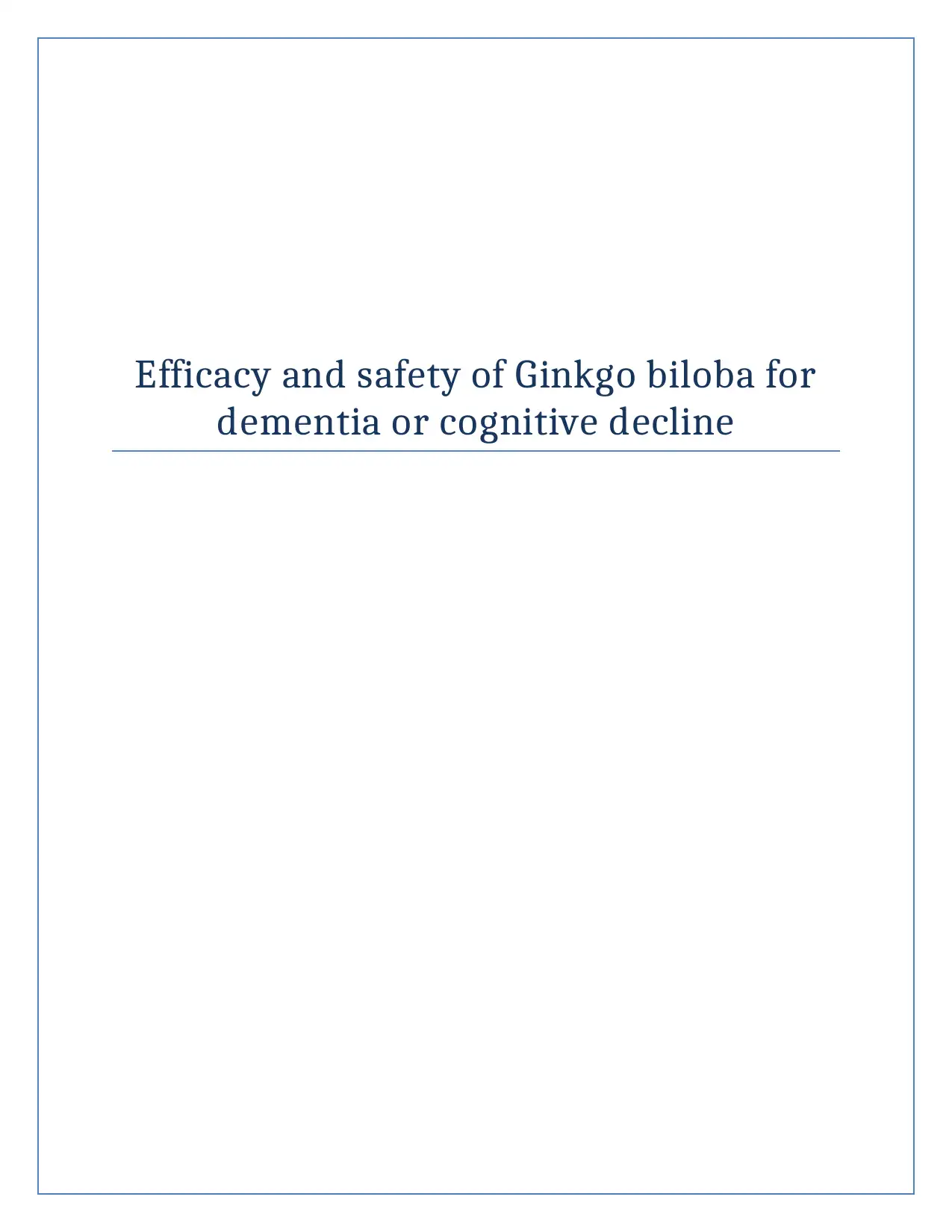
Efficacy and safety of Ginkgo biloba for
dementia or cognitive decline
dementia or cognitive decline
Secure Best Marks with AI Grader
Need help grading? Try our AI Grader for instant feedback on your assignments.
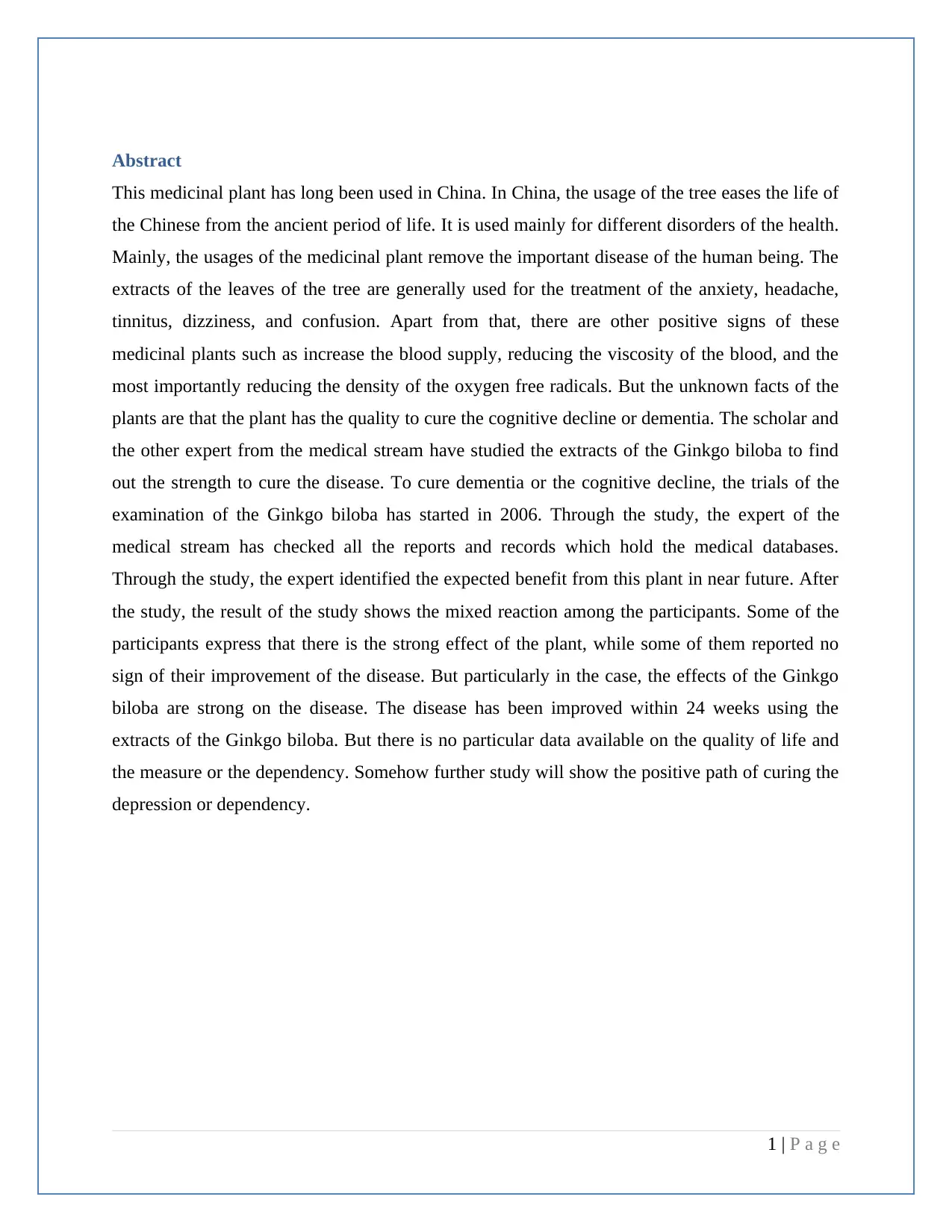
Abstract
This medicinal plant has long been used in China. In China, the usage of the tree eases the life of
the Chinese from the ancient period of life. It is used mainly for different disorders of the health.
Mainly, the usages of the medicinal plant remove the important disease of the human being. The
extracts of the leaves of the tree are generally used for the treatment of the anxiety, headache,
tinnitus, dizziness, and confusion. Apart from that, there are other positive signs of these
medicinal plants such as increase the blood supply, reducing the viscosity of the blood, and the
most importantly reducing the density of the oxygen free radicals. But the unknown facts of the
plants are that the plant has the quality to cure the cognitive decline or dementia. The scholar and
the other expert from the medical stream have studied the extracts of the Ginkgo biloba to find
out the strength to cure the disease. To cure dementia or the cognitive decline, the trials of the
examination of the Ginkgo biloba has started in 2006. Through the study, the expert of the
medical stream has checked all the reports and records which hold the medical databases.
Through the study, the expert identified the expected benefit from this plant in near future. After
the study, the result of the study shows the mixed reaction among the participants. Some of the
participants express that there is the strong effect of the plant, while some of them reported no
sign of their improvement of the disease. But particularly in the case, the effects of the Ginkgo
biloba are strong on the disease. The disease has been improved within 24 weeks using the
extracts of the Ginkgo biloba. But there is no particular data available on the quality of life and
the measure or the dependency. Somehow further study will show the positive path of curing the
depression or dependency.
1 | P a g e
This medicinal plant has long been used in China. In China, the usage of the tree eases the life of
the Chinese from the ancient period of life. It is used mainly for different disorders of the health.
Mainly, the usages of the medicinal plant remove the important disease of the human being. The
extracts of the leaves of the tree are generally used for the treatment of the anxiety, headache,
tinnitus, dizziness, and confusion. Apart from that, there are other positive signs of these
medicinal plants such as increase the blood supply, reducing the viscosity of the blood, and the
most importantly reducing the density of the oxygen free radicals. But the unknown facts of the
plants are that the plant has the quality to cure the cognitive decline or dementia. The scholar and
the other expert from the medical stream have studied the extracts of the Ginkgo biloba to find
out the strength to cure the disease. To cure dementia or the cognitive decline, the trials of the
examination of the Ginkgo biloba has started in 2006. Through the study, the expert of the
medical stream has checked all the reports and records which hold the medical databases.
Through the study, the expert identified the expected benefit from this plant in near future. After
the study, the result of the study shows the mixed reaction among the participants. Some of the
participants express that there is the strong effect of the plant, while some of them reported no
sign of their improvement of the disease. But particularly in the case, the effects of the Ginkgo
biloba are strong on the disease. The disease has been improved within 24 weeks using the
extracts of the Ginkgo biloba. But there is no particular data available on the quality of life and
the measure or the dependency. Somehow further study will show the positive path of curing the
depression or dependency.
1 | P a g e
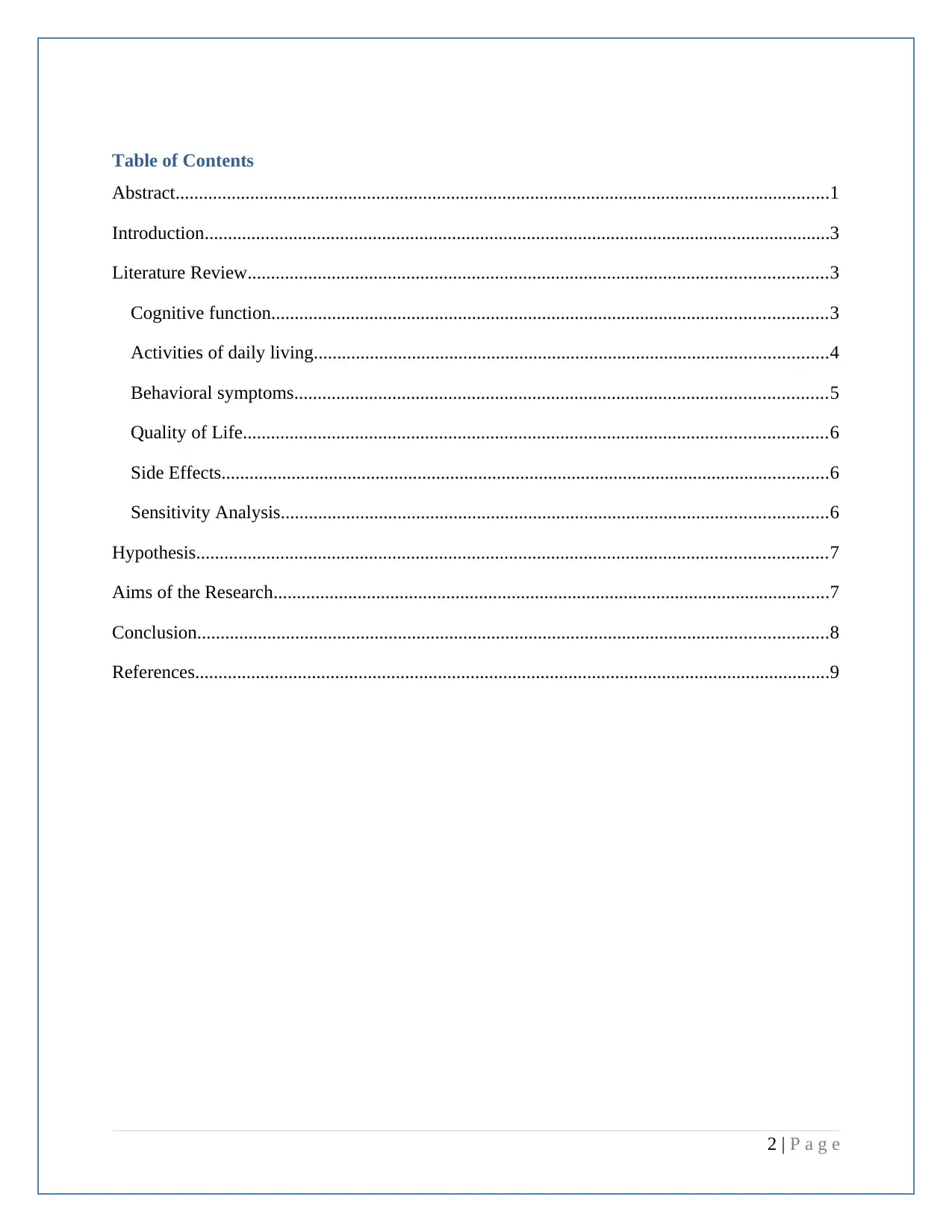
Table of Contents
Abstract............................................................................................................................................1
Introduction......................................................................................................................................3
Literature Review............................................................................................................................3
Cognitive function.......................................................................................................................3
Activities of daily living..............................................................................................................4
Behavioral symptoms..................................................................................................................5
Quality of Life.............................................................................................................................6
Side Effects..................................................................................................................................6
Sensitivity Analysis.....................................................................................................................6
Hypothesis.......................................................................................................................................7
Aims of the Research.......................................................................................................................7
Conclusion.......................................................................................................................................8
References........................................................................................................................................9
2 | P a g e
Abstract............................................................................................................................................1
Introduction......................................................................................................................................3
Literature Review............................................................................................................................3
Cognitive function.......................................................................................................................3
Activities of daily living..............................................................................................................4
Behavioral symptoms..................................................................................................................5
Quality of Life.............................................................................................................................6
Side Effects..................................................................................................................................6
Sensitivity Analysis.....................................................................................................................6
Hypothesis.......................................................................................................................................7
Aims of the Research.......................................................................................................................7
Conclusion.......................................................................................................................................8
References........................................................................................................................................9
2 | P a g e
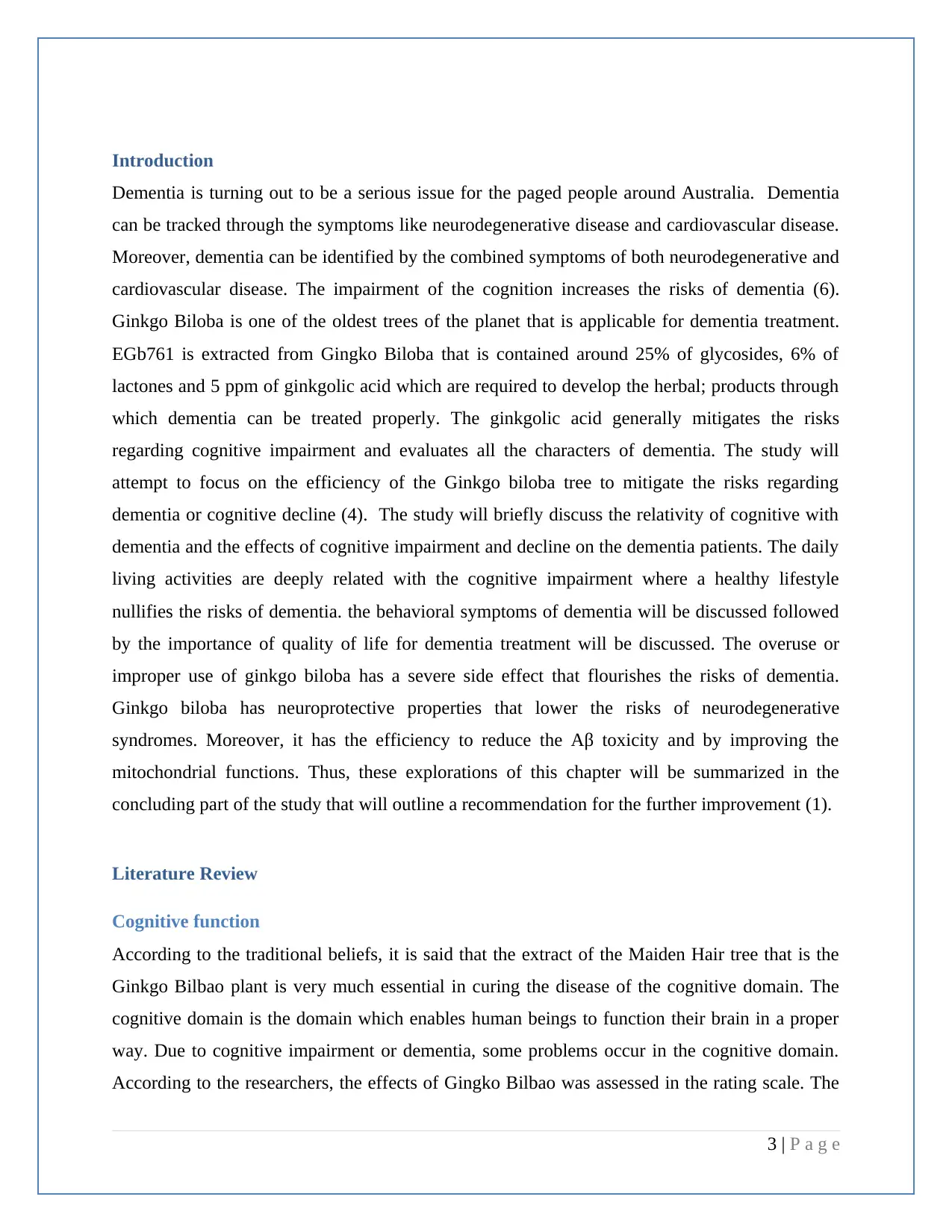
Introduction
Dementia is turning out to be a serious issue for the paged people around Australia. Dementia
can be tracked through the symptoms like neurodegenerative disease and cardiovascular disease.
Moreover, dementia can be identified by the combined symptoms of both neurodegenerative and
cardiovascular disease. The impairment of the cognition increases the risks of dementia (6).
Ginkgo Biloba is one of the oldest trees of the planet that is applicable for dementia treatment.
EGb761 is extracted from Gingko Biloba that is contained around 25% of glycosides, 6% of
lactones and 5 ppm of ginkgolic acid which are required to develop the herbal; products through
which dementia can be treated properly. The ginkgolic acid generally mitigates the risks
regarding cognitive impairment and evaluates all the characters of dementia. The study will
attempt to focus on the efficiency of the Ginkgo biloba tree to mitigate the risks regarding
dementia or cognitive decline (4). The study will briefly discuss the relativity of cognitive with
dementia and the effects of cognitive impairment and decline on the dementia patients. The daily
living activities are deeply related with the cognitive impairment where a healthy lifestyle
nullifies the risks of dementia. the behavioral symptoms of dementia will be discussed followed
by the importance of quality of life for dementia treatment will be discussed. The overuse or
improper use of ginkgo biloba has a severe side effect that flourishes the risks of dementia.
Ginkgo biloba has neuroprotective properties that lower the risks of neurodegenerative
syndromes. Moreover, it has the efficiency to reduce the Aβ toxicity and by improving the
mitochondrial functions. Thus, these explorations of this chapter will be summarized in the
concluding part of the study that will outline a recommendation for the further improvement (1).
Literature Review
Cognitive function
According to the traditional beliefs, it is said that the extract of the Maiden Hair tree that is the
Ginkgo Bilbao plant is very much essential in curing the disease of the cognitive domain. The
cognitive domain is the domain which enables human beings to function their brain in a proper
way. Due to cognitive impairment or dementia, some problems occur in the cognitive domain.
According to the researchers, the effects of Gingko Bilbao was assessed in the rating scale. The
3 | P a g e
Dementia is turning out to be a serious issue for the paged people around Australia. Dementia
can be tracked through the symptoms like neurodegenerative disease and cardiovascular disease.
Moreover, dementia can be identified by the combined symptoms of both neurodegenerative and
cardiovascular disease. The impairment of the cognition increases the risks of dementia (6).
Ginkgo Biloba is one of the oldest trees of the planet that is applicable for dementia treatment.
EGb761 is extracted from Gingko Biloba that is contained around 25% of glycosides, 6% of
lactones and 5 ppm of ginkgolic acid which are required to develop the herbal; products through
which dementia can be treated properly. The ginkgolic acid generally mitigates the risks
regarding cognitive impairment and evaluates all the characters of dementia. The study will
attempt to focus on the efficiency of the Ginkgo biloba tree to mitigate the risks regarding
dementia or cognitive decline (4). The study will briefly discuss the relativity of cognitive with
dementia and the effects of cognitive impairment and decline on the dementia patients. The daily
living activities are deeply related with the cognitive impairment where a healthy lifestyle
nullifies the risks of dementia. the behavioral symptoms of dementia will be discussed followed
by the importance of quality of life for dementia treatment will be discussed. The overuse or
improper use of ginkgo biloba has a severe side effect that flourishes the risks of dementia.
Ginkgo biloba has neuroprotective properties that lower the risks of neurodegenerative
syndromes. Moreover, it has the efficiency to reduce the Aβ toxicity and by improving the
mitochondrial functions. Thus, these explorations of this chapter will be summarized in the
concluding part of the study that will outline a recommendation for the further improvement (1).
Literature Review
Cognitive function
According to the traditional beliefs, it is said that the extract of the Maiden Hair tree that is the
Ginkgo Bilbao plant is very much essential in curing the disease of the cognitive domain. The
cognitive domain is the domain which enables human beings to function their brain in a proper
way. Due to cognitive impairment or dementia, some problems occur in the cognitive domain.
According to the researchers, the effects of Gingko Bilbao was assessed in the rating scale. The
3 | P a g e
Secure Best Marks with AI Grader
Need help grading? Try our AI Grader for instant feedback on your assignments.
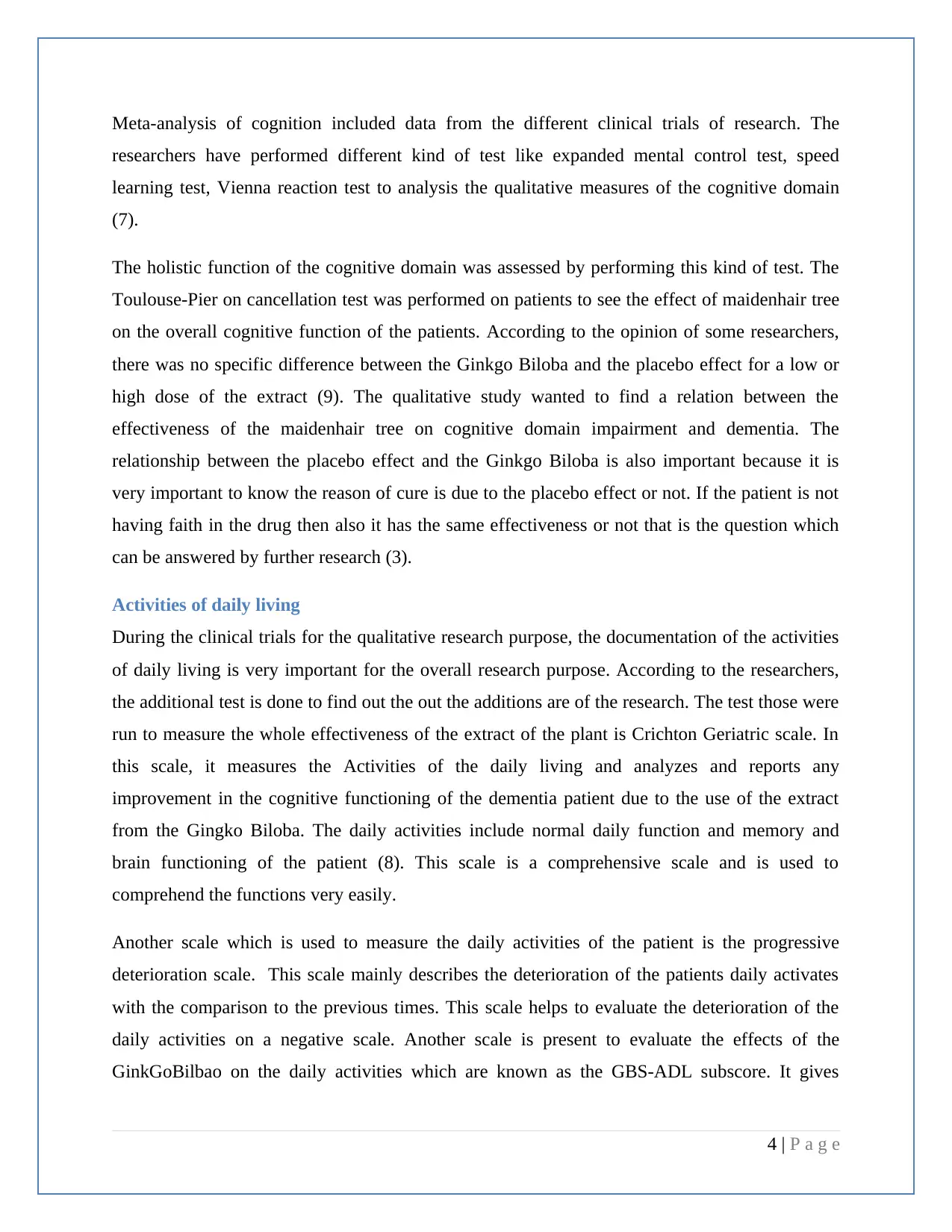
Meta-analysis of cognition included data from the different clinical trials of research. The
researchers have performed different kind of test like expanded mental control test, speed
learning test, Vienna reaction test to analysis the qualitative measures of the cognitive domain
(7).
The holistic function of the cognitive domain was assessed by performing this kind of test. The
Toulouse-Pier on cancellation test was performed on patients to see the effect of maidenhair tree
on the overall cognitive function of the patients. According to the opinion of some researchers,
there was no specific difference between the Ginkgo Biloba and the placebo effect for a low or
high dose of the extract (9). The qualitative study wanted to find a relation between the
effectiveness of the maidenhair tree on cognitive domain impairment and dementia. The
relationship between the placebo effect and the Ginkgo Biloba is also important because it is
very important to know the reason of cure is due to the placebo effect or not. If the patient is not
having faith in the drug then also it has the same effectiveness or not that is the question which
can be answered by further research (3).
Activities of daily living
During the clinical trials for the qualitative research purpose, the documentation of the activities
of daily living is very important for the overall research purpose. According to the researchers,
the additional test is done to find out the out the additions are of the research. The test those were
run to measure the whole effectiveness of the extract of the plant is Crichton Geriatric scale. In
this scale, it measures the Activities of the daily living and analyzes and reports any
improvement in the cognitive functioning of the dementia patient due to the use of the extract
from the Gingko Biloba. The daily activities include normal daily function and memory and
brain functioning of the patient (8). This scale is a comprehensive scale and is used to
comprehend the functions very easily.
Another scale which is used to measure the daily activities of the patient is the progressive
deterioration scale. This scale mainly describes the deterioration of the patients daily activates
with the comparison to the previous times. This scale helps to evaluate the deterioration of the
daily activities on a negative scale. Another scale is present to evaluate the effects of the
GinkGoBilbao on the daily activities which are known as the GBS-ADL subscore. It gives
4 | P a g e
researchers have performed different kind of test like expanded mental control test, speed
learning test, Vienna reaction test to analysis the qualitative measures of the cognitive domain
(7).
The holistic function of the cognitive domain was assessed by performing this kind of test. The
Toulouse-Pier on cancellation test was performed on patients to see the effect of maidenhair tree
on the overall cognitive function of the patients. According to the opinion of some researchers,
there was no specific difference between the Ginkgo Biloba and the placebo effect for a low or
high dose of the extract (9). The qualitative study wanted to find a relation between the
effectiveness of the maidenhair tree on cognitive domain impairment and dementia. The
relationship between the placebo effect and the Ginkgo Biloba is also important because it is
very important to know the reason of cure is due to the placebo effect or not. If the patient is not
having faith in the drug then also it has the same effectiveness or not that is the question which
can be answered by further research (3).
Activities of daily living
During the clinical trials for the qualitative research purpose, the documentation of the activities
of daily living is very important for the overall research purpose. According to the researchers,
the additional test is done to find out the out the additions are of the research. The test those were
run to measure the whole effectiveness of the extract of the plant is Crichton Geriatric scale. In
this scale, it measures the Activities of the daily living and analyzes and reports any
improvement in the cognitive functioning of the dementia patient due to the use of the extract
from the Gingko Biloba. The daily activities include normal daily function and memory and
brain functioning of the patient (8). This scale is a comprehensive scale and is used to
comprehend the functions very easily.
Another scale which is used to measure the daily activities of the patient is the progressive
deterioration scale. This scale mainly describes the deterioration of the patients daily activates
with the comparison to the previous times. This scale helps to evaluate the deterioration of the
daily activities on a negative scale. Another scale is present to evaluate the effects of the
GinkGoBilbao on the daily activities which are known as the GBS-ADL subscore. It gives
4 | P a g e
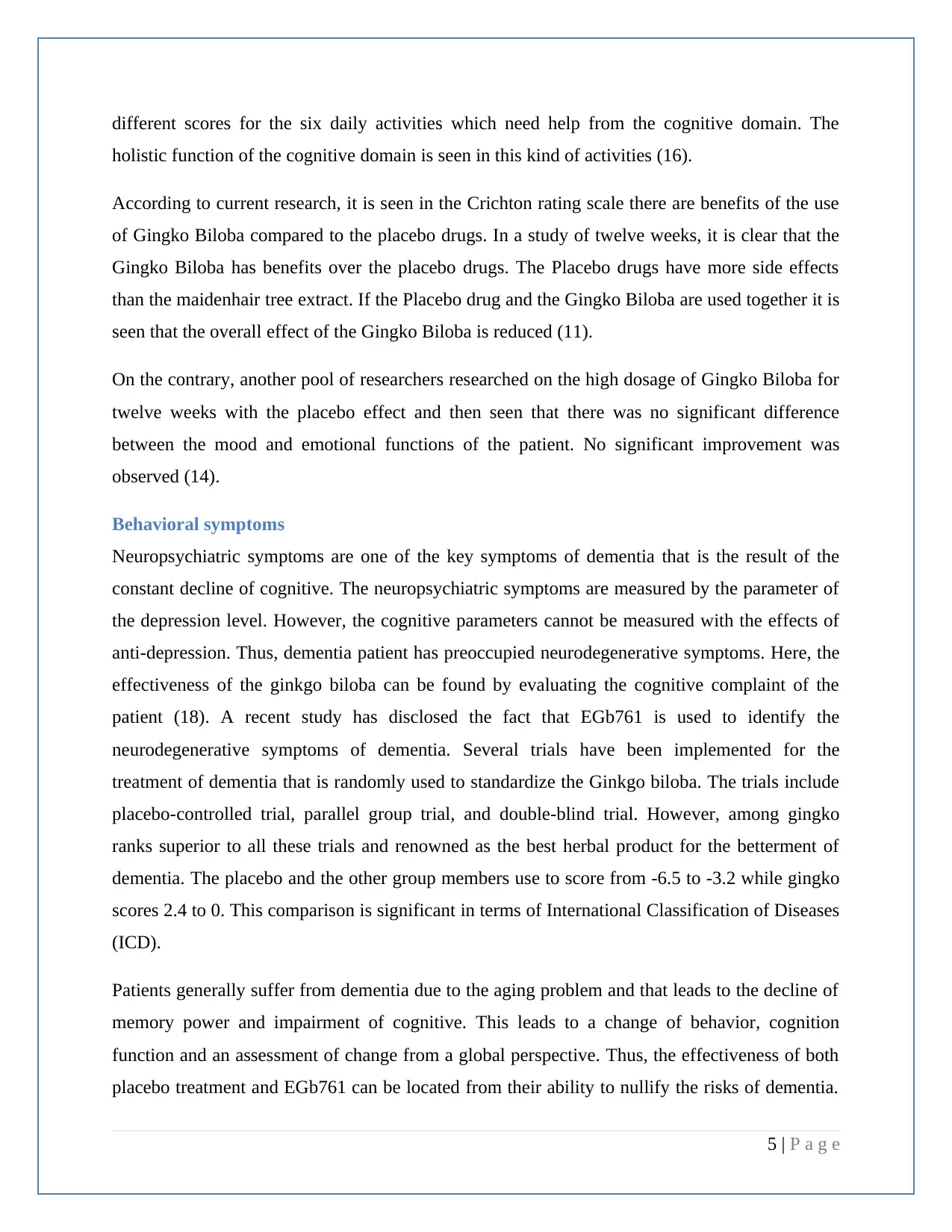
different scores for the six daily activities which need help from the cognitive domain. The
holistic function of the cognitive domain is seen in this kind of activities (16).
According to current research, it is seen in the Crichton rating scale there are benefits of the use
of Gingko Biloba compared to the placebo drugs. In a study of twelve weeks, it is clear that the
Gingko Biloba has benefits over the placebo drugs. The Placebo drugs have more side effects
than the maidenhair tree extract. If the Placebo drug and the Gingko Biloba are used together it is
seen that the overall effect of the Gingko Biloba is reduced (11).
On the contrary, another pool of researchers researched on the high dosage of Gingko Biloba for
twelve weeks with the placebo effect and then seen that there was no significant difference
between the mood and emotional functions of the patient. No significant improvement was
observed (14).
Behavioral symptoms
Neuropsychiatric symptoms are one of the key symptoms of dementia that is the result of the
constant decline of cognitive. The neuropsychiatric symptoms are measured by the parameter of
the depression level. However, the cognitive parameters cannot be measured with the effects of
anti-depression. Thus, dementia patient has preoccupied neurodegenerative symptoms. Here, the
effectiveness of the ginkgo biloba can be found by evaluating the cognitive complaint of the
patient (18). A recent study has disclosed the fact that EGb761 is used to identify the
neurodegenerative symptoms of dementia. Several trials have been implemented for the
treatment of dementia that is randomly used to standardize the Ginkgo biloba. The trials include
placebo-controlled trial, parallel group trial, and double-blind trial. However, among gingko
ranks superior to all these trials and renowned as the best herbal product for the betterment of
dementia. The placebo and the other group members use to score from -6.5 to -3.2 while gingko
scores 2.4 to 0. This comparison is significant in terms of International Classification of Diseases
(ICD).
Patients generally suffer from dementia due to the aging problem and that leads to the decline of
memory power and impairment of cognitive. This leads to a change of behavior, cognition
function and an assessment of change from a global perspective. Thus, the effectiveness of both
placebo treatment and EGb761 can be located from their ability to nullify the risks of dementia.
5 | P a g e
holistic function of the cognitive domain is seen in this kind of activities (16).
According to current research, it is seen in the Crichton rating scale there are benefits of the use
of Gingko Biloba compared to the placebo drugs. In a study of twelve weeks, it is clear that the
Gingko Biloba has benefits over the placebo drugs. The Placebo drugs have more side effects
than the maidenhair tree extract. If the Placebo drug and the Gingko Biloba are used together it is
seen that the overall effect of the Gingko Biloba is reduced (11).
On the contrary, another pool of researchers researched on the high dosage of Gingko Biloba for
twelve weeks with the placebo effect and then seen that there was no significant difference
between the mood and emotional functions of the patient. No significant improvement was
observed (14).
Behavioral symptoms
Neuropsychiatric symptoms are one of the key symptoms of dementia that is the result of the
constant decline of cognitive. The neuropsychiatric symptoms are measured by the parameter of
the depression level. However, the cognitive parameters cannot be measured with the effects of
anti-depression. Thus, dementia patient has preoccupied neurodegenerative symptoms. Here, the
effectiveness of the ginkgo biloba can be found by evaluating the cognitive complaint of the
patient (18). A recent study has disclosed the fact that EGb761 is used to identify the
neurodegenerative symptoms of dementia. Several trials have been implemented for the
treatment of dementia that is randomly used to standardize the Ginkgo biloba. The trials include
placebo-controlled trial, parallel group trial, and double-blind trial. However, among gingko
ranks superior to all these trials and renowned as the best herbal product for the betterment of
dementia. The placebo and the other group members use to score from -6.5 to -3.2 while gingko
scores 2.4 to 0. This comparison is significant in terms of International Classification of Diseases
(ICD).
Patients generally suffer from dementia due to the aging problem and that leads to the decline of
memory power and impairment of cognitive. This leads to a change of behavior, cognition
function and an assessment of change from a global perspective. Thus, the effectiveness of both
placebo treatment and EGb761 can be located from their ability to nullify the risks of dementia.
5 | P a g e
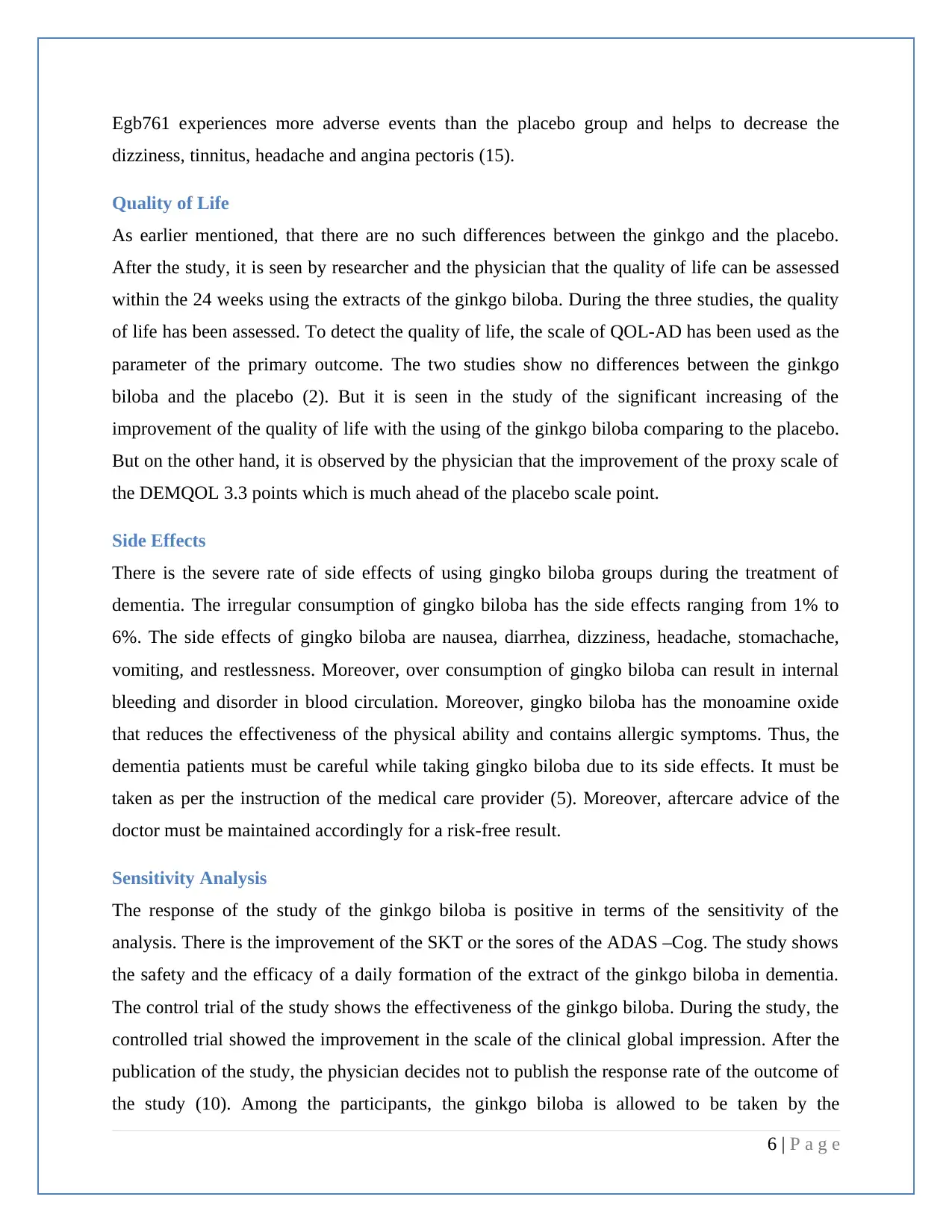
Egb761 experiences more adverse events than the placebo group and helps to decrease the
dizziness, tinnitus, headache and angina pectoris (15).
Quality of Life
As earlier mentioned, that there are no such differences between the ginkgo and the placebo.
After the study, it is seen by researcher and the physician that the quality of life can be assessed
within the 24 weeks using the extracts of the ginkgo biloba. During the three studies, the quality
of life has been assessed. To detect the quality of life, the scale of QOL-AD has been used as the
parameter of the primary outcome. The two studies show no differences between the ginkgo
biloba and the placebo (2). But it is seen in the study of the significant increasing of the
improvement of the quality of life with the using of the ginkgo biloba comparing to the placebo.
But on the other hand, it is observed by the physician that the improvement of the proxy scale of
the DEMQOL 3.3 points which is much ahead of the placebo scale point.
Side Effects
There is the severe rate of side effects of using gingko biloba groups during the treatment of
dementia. The irregular consumption of gingko biloba has the side effects ranging from 1% to
6%. The side effects of gingko biloba are nausea, diarrhea, dizziness, headache, stomachache,
vomiting, and restlessness. Moreover, over consumption of gingko biloba can result in internal
bleeding and disorder in blood circulation. Moreover, gingko biloba has the monoamine oxide
that reduces the effectiveness of the physical ability and contains allergic symptoms. Thus, the
dementia patients must be careful while taking gingko biloba due to its side effects. It must be
taken as per the instruction of the medical care provider (5). Moreover, aftercare advice of the
doctor must be maintained accordingly for a risk-free result.
Sensitivity Analysis
The response of the study of the ginkgo biloba is positive in terms of the sensitivity of the
analysis. There is the improvement of the SKT or the sores of the ADAS –Cog. The study shows
the safety and the efficacy of a daily formation of the extract of the ginkgo biloba in dementia.
The control trial of the study shows the effectiveness of the ginkgo biloba. During the study, the
controlled trial showed the improvement in the scale of the clinical global impression. After the
publication of the study, the physician decides not to publish the response rate of the outcome of
the study (10). Among the participants, the ginkgo biloba is allowed to be taken by the
6 | P a g e
dizziness, tinnitus, headache and angina pectoris (15).
Quality of Life
As earlier mentioned, that there are no such differences between the ginkgo and the placebo.
After the study, it is seen by researcher and the physician that the quality of life can be assessed
within the 24 weeks using the extracts of the ginkgo biloba. During the three studies, the quality
of life has been assessed. To detect the quality of life, the scale of QOL-AD has been used as the
parameter of the primary outcome. The two studies show no differences between the ginkgo
biloba and the placebo (2). But it is seen in the study of the significant increasing of the
improvement of the quality of life with the using of the ginkgo biloba comparing to the placebo.
But on the other hand, it is observed by the physician that the improvement of the proxy scale of
the DEMQOL 3.3 points which is much ahead of the placebo scale point.
Side Effects
There is the severe rate of side effects of using gingko biloba groups during the treatment of
dementia. The irregular consumption of gingko biloba has the side effects ranging from 1% to
6%. The side effects of gingko biloba are nausea, diarrhea, dizziness, headache, stomachache,
vomiting, and restlessness. Moreover, over consumption of gingko biloba can result in internal
bleeding and disorder in blood circulation. Moreover, gingko biloba has the monoamine oxide
that reduces the effectiveness of the physical ability and contains allergic symptoms. Thus, the
dementia patients must be careful while taking gingko biloba due to its side effects. It must be
taken as per the instruction of the medical care provider (5). Moreover, aftercare advice of the
doctor must be maintained accordingly for a risk-free result.
Sensitivity Analysis
The response of the study of the ginkgo biloba is positive in terms of the sensitivity of the
analysis. There is the improvement of the SKT or the sores of the ADAS –Cog. The study shows
the safety and the efficacy of a daily formation of the extract of the ginkgo biloba in dementia.
The control trial of the study shows the effectiveness of the ginkgo biloba. During the study, the
controlled trial showed the improvement in the scale of the clinical global impression. After the
publication of the study, the physician decides not to publish the response rate of the outcome of
the study (10). Among the participants, the ginkgo biloba is allowed to be taken by the
6 | P a g e
Paraphrase This Document
Need a fresh take? Get an instant paraphrase of this document with our AI Paraphraser
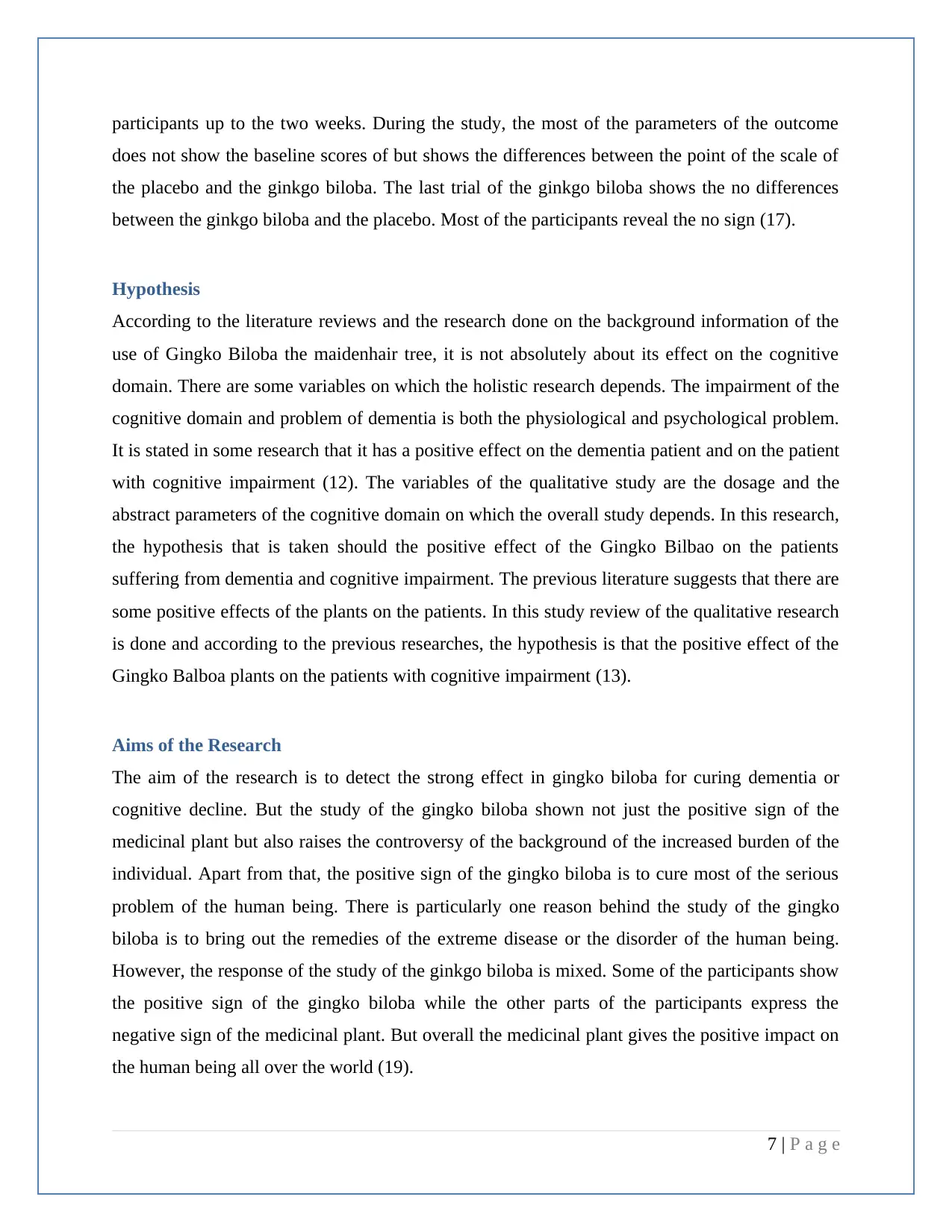
participants up to the two weeks. During the study, the most of the parameters of the outcome
does not show the baseline scores of but shows the differences between the point of the scale of
the placebo and the ginkgo biloba. The last trial of the ginkgo biloba shows the no differences
between the ginkgo biloba and the placebo. Most of the participants reveal the no sign (17).
Hypothesis
According to the literature reviews and the research done on the background information of the
use of Gingko Biloba the maidenhair tree, it is not absolutely about its effect on the cognitive
domain. There are some variables on which the holistic research depends. The impairment of the
cognitive domain and problem of dementia is both the physiological and psychological problem.
It is stated in some research that it has a positive effect on the dementia patient and on the patient
with cognitive impairment (12). The variables of the qualitative study are the dosage and the
abstract parameters of the cognitive domain on which the overall study depends. In this research,
the hypothesis that is taken should the positive effect of the Gingko Bilbao on the patients
suffering from dementia and cognitive impairment. The previous literature suggests that there are
some positive effects of the plants on the patients. In this study review of the qualitative research
is done and according to the previous researches, the hypothesis is that the positive effect of the
Gingko Balboa plants on the patients with cognitive impairment (13).
Aims of the Research
The aim of the research is to detect the strong effect in gingko biloba for curing dementia or
cognitive decline. But the study of the gingko biloba shown not just the positive sign of the
medicinal plant but also raises the controversy of the background of the increased burden of the
individual. Apart from that, the positive sign of the gingko biloba is to cure most of the serious
problem of the human being. There is particularly one reason behind the study of the gingko
biloba is to bring out the remedies of the extreme disease or the disorder of the human being.
However, the response of the study of the ginkgo biloba is mixed. Some of the participants show
the positive sign of the gingko biloba while the other parts of the participants express the
negative sign of the medicinal plant. But overall the medicinal plant gives the positive impact on
the human being all over the world (19).
7 | P a g e
does not show the baseline scores of but shows the differences between the point of the scale of
the placebo and the ginkgo biloba. The last trial of the ginkgo biloba shows the no differences
between the ginkgo biloba and the placebo. Most of the participants reveal the no sign (17).
Hypothesis
According to the literature reviews and the research done on the background information of the
use of Gingko Biloba the maidenhair tree, it is not absolutely about its effect on the cognitive
domain. There are some variables on which the holistic research depends. The impairment of the
cognitive domain and problem of dementia is both the physiological and psychological problem.
It is stated in some research that it has a positive effect on the dementia patient and on the patient
with cognitive impairment (12). The variables of the qualitative study are the dosage and the
abstract parameters of the cognitive domain on which the overall study depends. In this research,
the hypothesis that is taken should the positive effect of the Gingko Bilbao on the patients
suffering from dementia and cognitive impairment. The previous literature suggests that there are
some positive effects of the plants on the patients. In this study review of the qualitative research
is done and according to the previous researches, the hypothesis is that the positive effect of the
Gingko Balboa plants on the patients with cognitive impairment (13).
Aims of the Research
The aim of the research is to detect the strong effect in gingko biloba for curing dementia or
cognitive decline. But the study of the gingko biloba shown not just the positive sign of the
medicinal plant but also raises the controversy of the background of the increased burden of the
individual. Apart from that, the positive sign of the gingko biloba is to cure most of the serious
problem of the human being. There is particularly one reason behind the study of the gingko
biloba is to bring out the remedies of the extreme disease or the disorder of the human being.
However, the response of the study of the ginkgo biloba is mixed. Some of the participants show
the positive sign of the gingko biloba while the other parts of the participants express the
negative sign of the medicinal plant. But overall the medicinal plant gives the positive impact on
the human being all over the world (19).
7 | P a g e
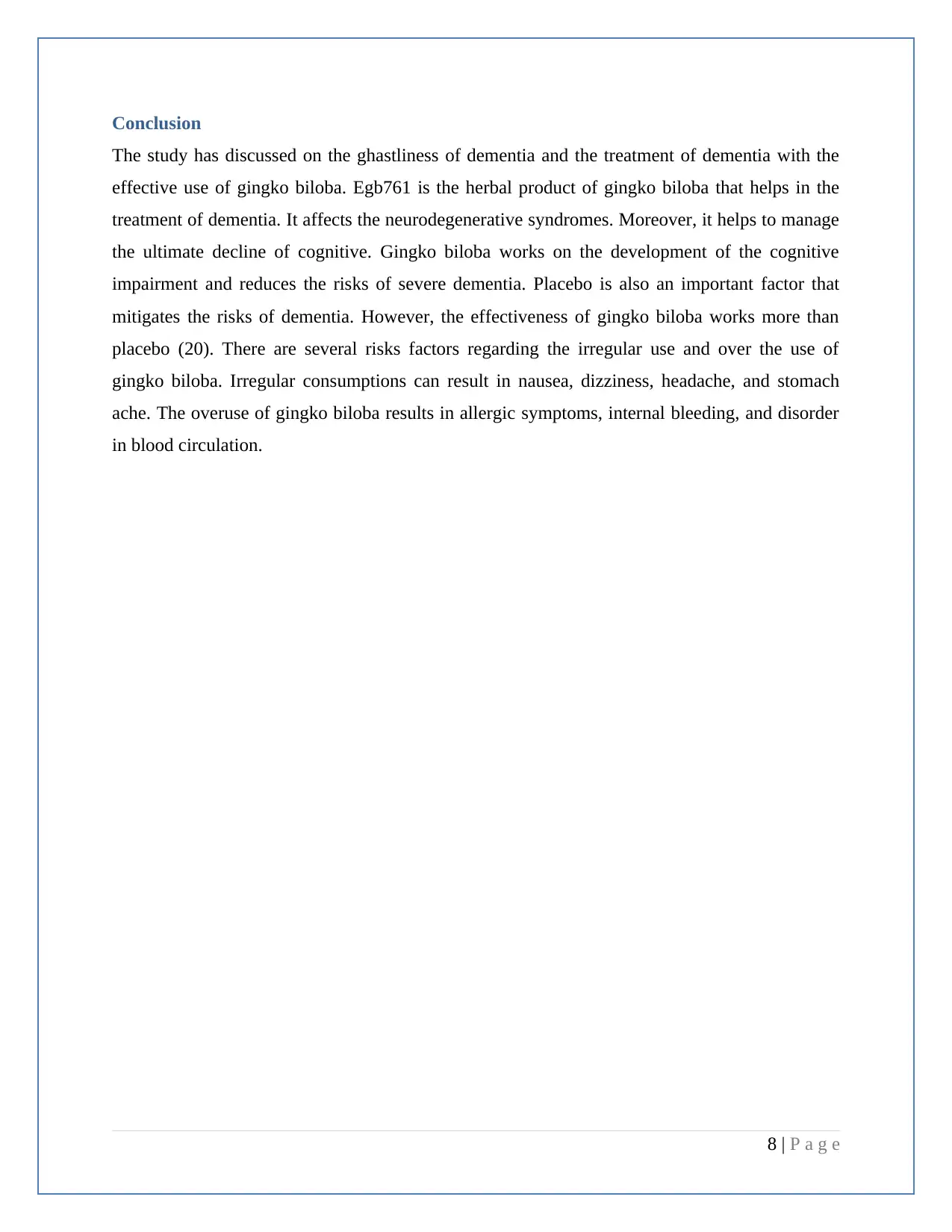
Conclusion
The study has discussed on the ghastliness of dementia and the treatment of dementia with the
effective use of gingko biloba. Egb761 is the herbal product of gingko biloba that helps in the
treatment of dementia. It affects the neurodegenerative syndromes. Moreover, it helps to manage
the ultimate decline of cognitive. Gingko biloba works on the development of the cognitive
impairment and reduces the risks of severe dementia. Placebo is also an important factor that
mitigates the risks of dementia. However, the effectiveness of gingko biloba works more than
placebo (20). There are several risks factors regarding the irregular use and over the use of
gingko biloba. Irregular consumptions can result in nausea, dizziness, headache, and stomach
ache. The overuse of gingko biloba results in allergic symptoms, internal bleeding, and disorder
in blood circulation.
8 | P a g e
The study has discussed on the ghastliness of dementia and the treatment of dementia with the
effective use of gingko biloba. Egb761 is the herbal product of gingko biloba that helps in the
treatment of dementia. It affects the neurodegenerative syndromes. Moreover, it helps to manage
the ultimate decline of cognitive. Gingko biloba works on the development of the cognitive
impairment and reduces the risks of severe dementia. Placebo is also an important factor that
mitigates the risks of dementia. However, the effectiveness of gingko biloba works more than
placebo (20). There are several risks factors regarding the irregular use and over the use of
gingko biloba. Irregular consumptions can result in nausea, dizziness, headache, and stomach
ache. The overuse of gingko biloba results in allergic symptoms, internal bleeding, and disorder
in blood circulation.
8 | P a g e
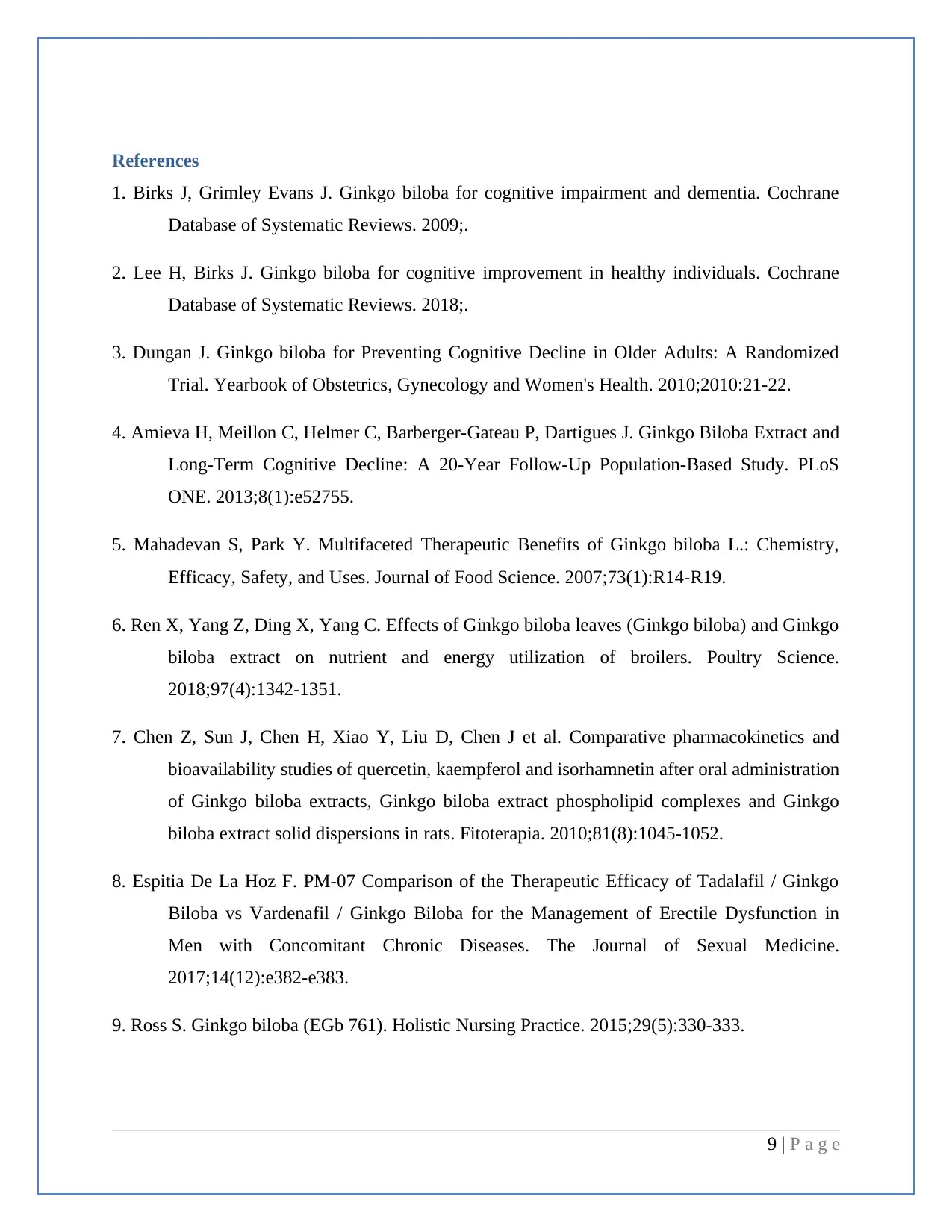
References
1. Birks J, Grimley Evans J. Ginkgo biloba for cognitive impairment and dementia. Cochrane
Database of Systematic Reviews. 2009;.
2. Lee H, Birks J. Ginkgo biloba for cognitive improvement in healthy individuals. Cochrane
Database of Systematic Reviews. 2018;.
3. Dungan J. Ginkgo biloba for Preventing Cognitive Decline in Older Adults: A Randomized
Trial. Yearbook of Obstetrics, Gynecology and Women's Health. 2010;2010:21-22.
4. Amieva H, Meillon C, Helmer C, Barberger-Gateau P, Dartigues J. Ginkgo Biloba Extract and
Long-Term Cognitive Decline: A 20-Year Follow-Up Population-Based Study. PLoS
ONE. 2013;8(1):e52755.
5. Mahadevan S, Park Y. Multifaceted Therapeutic Benefits of Ginkgo biloba L.: Chemistry,
Efficacy, Safety, and Uses. Journal of Food Science. 2007;73(1):R14-R19.
6. Ren X, Yang Z, Ding X, Yang C. Effects of Ginkgo biloba leaves (Ginkgo biloba) and Ginkgo
biloba extract on nutrient and energy utilization of broilers. Poultry Science.
2018;97(4):1342-1351.
7. Chen Z, Sun J, Chen H, Xiao Y, Liu D, Chen J et al. Comparative pharmacokinetics and
bioavailability studies of quercetin, kaempferol and isorhamnetin after oral administration
of Ginkgo biloba extracts, Ginkgo biloba extract phospholipid complexes and Ginkgo
biloba extract solid dispersions in rats. Fitoterapia. 2010;81(8):1045-1052.
8. Espitia De La Hoz F. PM-07 Comparison of the Therapeutic Efficacy of Tadalafil / Ginkgo
Biloba vs Vardenafil / Ginkgo Biloba for the Management of Erectile Dysfunction in
Men with Concomitant Chronic Diseases. The Journal of Sexual Medicine.
2017;14(12):e382-e383.
9. Ross S. Ginkgo biloba (EGb 761). Holistic Nursing Practice. 2015;29(5):330-333.
9 | P a g e
1. Birks J, Grimley Evans J. Ginkgo biloba for cognitive impairment and dementia. Cochrane
Database of Systematic Reviews. 2009;.
2. Lee H, Birks J. Ginkgo biloba for cognitive improvement in healthy individuals. Cochrane
Database of Systematic Reviews. 2018;.
3. Dungan J. Ginkgo biloba for Preventing Cognitive Decline in Older Adults: A Randomized
Trial. Yearbook of Obstetrics, Gynecology and Women's Health. 2010;2010:21-22.
4. Amieva H, Meillon C, Helmer C, Barberger-Gateau P, Dartigues J. Ginkgo Biloba Extract and
Long-Term Cognitive Decline: A 20-Year Follow-Up Population-Based Study. PLoS
ONE. 2013;8(1):e52755.
5. Mahadevan S, Park Y. Multifaceted Therapeutic Benefits of Ginkgo biloba L.: Chemistry,
Efficacy, Safety, and Uses. Journal of Food Science. 2007;73(1):R14-R19.
6. Ren X, Yang Z, Ding X, Yang C. Effects of Ginkgo biloba leaves (Ginkgo biloba) and Ginkgo
biloba extract on nutrient and energy utilization of broilers. Poultry Science.
2018;97(4):1342-1351.
7. Chen Z, Sun J, Chen H, Xiao Y, Liu D, Chen J et al. Comparative pharmacokinetics and
bioavailability studies of quercetin, kaempferol and isorhamnetin after oral administration
of Ginkgo biloba extracts, Ginkgo biloba extract phospholipid complexes and Ginkgo
biloba extract solid dispersions in rats. Fitoterapia. 2010;81(8):1045-1052.
8. Espitia De La Hoz F. PM-07 Comparison of the Therapeutic Efficacy of Tadalafil / Ginkgo
Biloba vs Vardenafil / Ginkgo Biloba for the Management of Erectile Dysfunction in
Men with Concomitant Chronic Diseases. The Journal of Sexual Medicine.
2017;14(12):e382-e383.
9. Ross S. Ginkgo biloba (EGb 761). Holistic Nursing Practice. 2015;29(5):330-333.
9 | P a g e
Secure Best Marks with AI Grader
Need help grading? Try our AI Grader for instant feedback on your assignments.
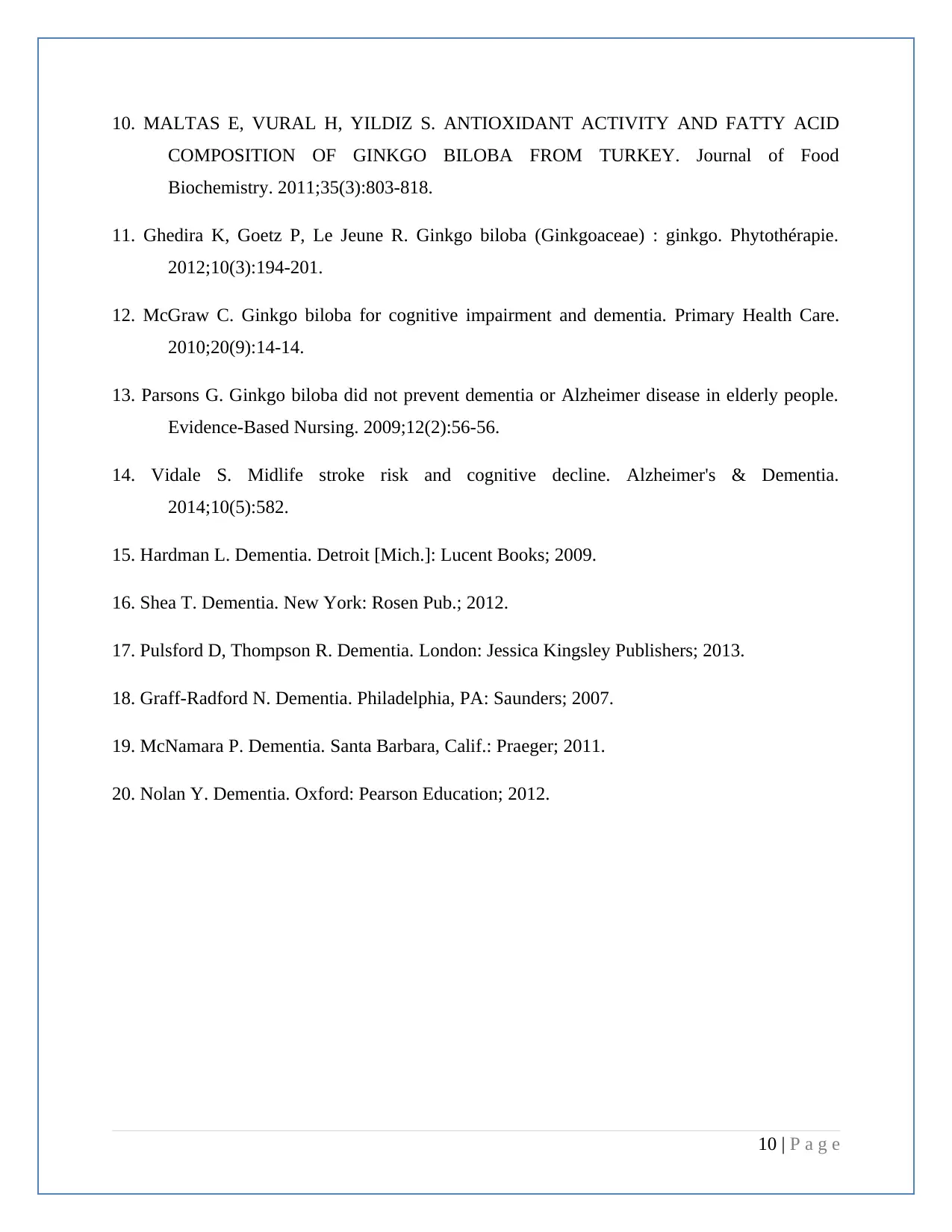
10. MALTAS E, VURAL H, YILDIZ S. ANTIOXIDANT ACTIVITY AND FATTY ACID
COMPOSITION OF GINKGO BILOBA FROM TURKEY. Journal of Food
Biochemistry. 2011;35(3):803-818.
11. Ghedira K, Goetz P, Le Jeune R. Ginkgo biloba (Ginkgoaceae) : ginkgo. Phytothérapie.
2012;10(3):194-201.
12. McGraw C. Ginkgo biloba for cognitive impairment and dementia. Primary Health Care.
2010;20(9):14-14.
13. Parsons G. Ginkgo biloba did not prevent dementia or Alzheimer disease in elderly people.
Evidence-Based Nursing. 2009;12(2):56-56.
14. Vidale S. Midlife stroke risk and cognitive decline. Alzheimer's & Dementia.
2014;10(5):582.
15. Hardman L. Dementia. Detroit [Mich.]: Lucent Books; 2009.
16. Shea T. Dementia. New York: Rosen Pub.; 2012.
17. Pulsford D, Thompson R. Dementia. London: Jessica Kingsley Publishers; 2013.
18. Graff-Radford N. Dementia. Philadelphia, PA: Saunders; 2007.
19. McNamara P. Dementia. Santa Barbara, Calif.: Praeger; 2011.
20. Nolan Y. Dementia. Oxford: Pearson Education; 2012.
10 | P a g e
COMPOSITION OF GINKGO BILOBA FROM TURKEY. Journal of Food
Biochemistry. 2011;35(3):803-818.
11. Ghedira K, Goetz P, Le Jeune R. Ginkgo biloba (Ginkgoaceae) : ginkgo. Phytothérapie.
2012;10(3):194-201.
12. McGraw C. Ginkgo biloba for cognitive impairment and dementia. Primary Health Care.
2010;20(9):14-14.
13. Parsons G. Ginkgo biloba did not prevent dementia or Alzheimer disease in elderly people.
Evidence-Based Nursing. 2009;12(2):56-56.
14. Vidale S. Midlife stroke risk and cognitive decline. Alzheimer's & Dementia.
2014;10(5):582.
15. Hardman L. Dementia. Detroit [Mich.]: Lucent Books; 2009.
16. Shea T. Dementia. New York: Rosen Pub.; 2012.
17. Pulsford D, Thompson R. Dementia. London: Jessica Kingsley Publishers; 2013.
18. Graff-Radford N. Dementia. Philadelphia, PA: Saunders; 2007.
19. McNamara P. Dementia. Santa Barbara, Calif.: Praeger; 2011.
20. Nolan Y. Dementia. Oxford: Pearson Education; 2012.
10 | P a g e
1 out of 11
Your All-in-One AI-Powered Toolkit for Academic Success.
+13062052269
info@desklib.com
Available 24*7 on WhatsApp / Email
![[object Object]](/_next/static/media/star-bottom.7253800d.svg)
Unlock your academic potential
© 2024 | Zucol Services PVT LTD | All rights reserved.


